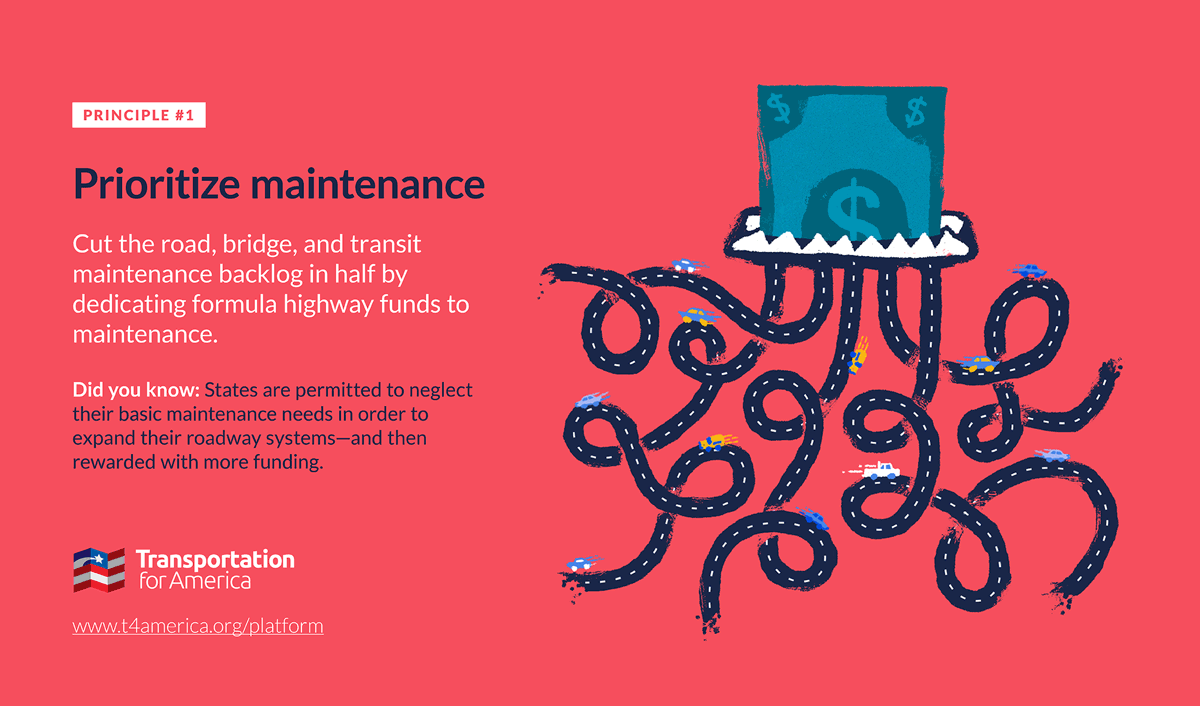Voters in two states consider measures to restrict funding to transportation uses
Facing the uncertainty of stable federal transportation funding and often unwilling to raise their own taxes to fund transportation, some states have seized upon the idea of protecting their transportation revenues for transportation uses. On Nov. 4, Maryland and Wisconsin voters will be deciding on similar measures that would put transportation funds into protected accounts that can’t be appropriated for non-transportation uses.
Unlike the protected federal trust fund for transportation, the revenues gathered from the systems’ users in many states (gas taxes, fees and other sources) can be appropriated for other non-transportation needs. In Maryland, more than $1.3 billion intended for transportation has been appropriated to other items in the budget over the last few years, according to Greater Greater Washington’s detailed look at the measure.
Currently, the various transportation taxes in Maryland go into a state trust fund for improving safety, reducing congestion, and improving mass transit, air travel, and port facilities — but those funds can be easily moved by legislators each year to fill other gaps in the budget.
Maryland’s Question 1 would require the governor to declare a state of fiscal emergency and get a three-fifths vote from both houses of the General Assembly before any funds could be taken out of the transportation trust fund.
Supporters of Question 1 argue that by placing revenues in a “lockbox” it will ensure stable funding for long-term projects, improve accountability, and help restore the confidence of voters and those paying into the system. After all, if Maryland wanted to increase their gas tax some day in the future, it certainly becomes easier to convince voters of the need when they can also guarantee that any new revenues would be spent on transportation needs.
Proponents include a range of business groups, AAA, transit advocates in the Baltimore and Washington, DC regions, and real estate professionals; with little organized opposition to the measure.
Wisconsin is considering a similar measure. With a conservative governor, Scott Walker, and a legislature resistant to raising the gas tax or registration fees, Wisconsin’s referendum would amend the state constitution to require any revenues derived from the transportation system to be spent on transportation projects and making them non-transferable to other needs. To date, $1.3 billion has been transferred out of the transportation fund, according to the Milwaukee Journal-Sentinel.
The Wisconsin proposal actually had its genesis several years ago and has only now reached the ballot because state law requires two consecutive legislatures to approve a joint resolution before it can be placed on the ballot.
Supporters under the banner of “Vote Yes for Transportation” include chambers of commerce, corporations, and labor unions. While some advocates, such as Forward Lookout and Bus, Bike, Walk Wisconsin have expressed concern that this could be the first step toward restricting the use of transportation user fees for transit or other multimodal projects, nothing in this legislation appears to do anything like that, and according to Vote Yes for Transportation, “Wisconsin’s segregated transportation fund is the sole source of state funding for the entire transportation system – highways, air, rail, transit, harbors, bicycle, and pedestrian facilities.”
There is no organized opposition, though some state legislators question the need for such a lockbox. Senator Fred Risser (D-Madison) expressed concerns about special interests groups, saying, “It guarantees the highway lobby a lock on certain funds. To give one special-interest group a constitutional lock on a hunk of money, I do not think is good public policy. “
According to most of the data we’ve seen, both measures are likely to pass, but we’ll be keeping an eye on the results, and posting them on Transportation Vote 2014 after the election, so check back. You can keep track of the other state and local transportation ballot measures we’re following there as well.
To better serve the states and localities stepping up to try and raise revenue to invest in transportation, we are hosting the Capital Ideas Conference in Denver, Colorado on November 13-14 shortly after this year’s elections. If you have been working on a transportation measure as part of a funding campaign, working to overcome a legislative impasse, or defending a key legislative win, this conference will offer a detailed, interactive curriculum of best practices, campaign tactics, innovative policies, and peer-to-peer collaboration to help your initiative succeed. Join us there.





















Pingback: Fact Checking the Florida Department of Transportation | Streetsblog.net
Pingback: Today’s Headlines | Streetsblog USA
Pingback: 6 Transportation Ballot Initiatives to Watch Next Tuesday | Streetsblog USA
Pingback: The Final Push – Vote FOR Question 1 – Vote Today! | Suburban Maryland Transportation Alliance